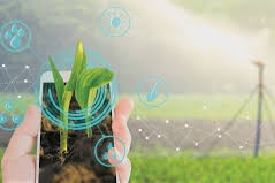 05 July 2022
05 July 2022The Future of Farming, Smart Irrigation Solutions
Introduction:
In an era marked by climate change and water scarcity, the future of farming hinges on innovative solutions that optimize water use, enhance crop productivity, and promote environmental sustainability. Enter smart irrigation solutions: a game-changing technology poised to revolutionize agriculture. Join us as we explore the transformative potential of smart irrigation in shaping the future of farming.
The Future of Farming, Smart Irrigation Solutions:
1. Maximizing Water Efficiency:
Smart irrigation solutions utilize cutting-edge technology, such as soil moisture sensors, weather data analytics, and precision irrigation systems, to optimize water use on the farm. By delivering the right amount of water, at the right time, and to the right place, smart irrigation minimizes water waste and maximizes efficiency, even in water-stressed environments.
2. Enhancing Crop Health and Yield:
By providing crops with the precise amount of water they need, smart irrigation solutions promote optimal plant health and growth. Consistent soil moisture levels prevent both water stress and waterlogging, reducing the risk of crop diseases and improving yield potential. With smart irrigation, farmers can cultivate healthier, more resilient crops and achieve higher yields with fewer resources.
3. Minimizing Environmental Impact:
Smart irrigation solutions not only benefit farmers but also contribute to environmental sustainability. By reducing water usage and minimizing runoff and leaching, smart irrigation helps conserve precious water resources and protect sensitive ecosystems. Additionally, by optimizing nutrient delivery through fertigation systems, smart irrigation reduces the risk of nutrient pollution in water bodies, promoting cleaner, healthier environments.
4. Empowering Farmers with Data-Driven Insights:
Another key advantage of smart irrigation solutions is their ability to provide farmers with real-time data and insights about their crops and soil conditions. By monitoring soil moisture levels, weather patterns, and crop water requirements, farmers can make informed decisions about irrigation scheduling, crop management, and resource allocation, leading to more efficient and sustainable farming practices.
5. Driving Innovation and Sustainable Agriculture:
Smart irrigation solutions represent a significant step forward in the journey towards sustainable agriculture. By harnessing the power of technology to optimize water use, enhance crop productivity, and minimize environmental impact, smart irrigation is paving the way for a more resilient and sustainable food system. As we continue to innovate and adapt to the challenges of a changing climate, smart irrigation will play a crucial role in ensuring food security and agricultural sustainability for future generations.
Conclusion:
As we stand on the brink of a new era in agriculture, smart irrigation solutions offer a beacon of hope for farmers and communities around the world. By embracing this transformative technology, we can unlock new opportunities for water conservation, crop resilience, and environmental stewardship, shaping a brighter, more sustainable future for farming and food production. Let’s embrace the future of farming with smart irrigation solutions and cultivate a world where agriculture thrives in harmony with nature.


